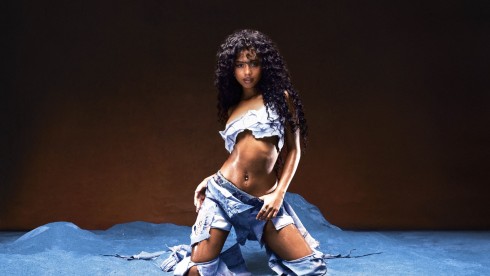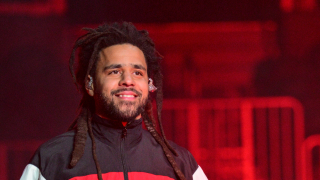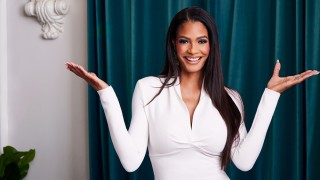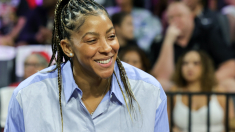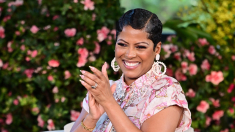Muhammad Ali was a complex figure. He was magnetic and outspoken. A true revolutionary. A one of a kind figure in and outside of the ring. Eighteen documentaries have been made about the legendary boxer trying to dissect his life and career; yet, none have fully truly succeeded in unboxing all of his enigmas. Tonight, Muhammad Ali, another doc enters the arena and tries to offer us a complete picture of the iconic, charismatic figure.
EBONY had the honor of chatting with Ali’s daughter Hana, as well Ken Burns, one of the directors of the film, on the importance of Ali and how this latest labor of love captures the extraordinary boxer in all of his forms.
EBONY: There have been 18 documentaries made on Ali. What does this one showcase that the others haven't?
Hana Ali: I would have to say that each has their own uniqueness. But in this one, I didn't expect to see so much new footage. The project feels whole. The context that was brought to touchy subjects such as his treatment of Joe Frazier, for instance, showed a lot of integrity from the production staff. What they did here was really capture my dad in his true essence.
Ken, as such an acclaimed documentarian, what layers or nuances did you feel were missing from the other works ?
Ken Burns: We just felt that there was another story to tell. Not to say that other efforts glossed over things. But we wanted to dive into Ali’s interrelationships more. This film is as much about Ali as it is the key people that were around him throughout his life. We set out to convey Ali in his truest form—as we saw it. So this project was about capturing Ali’s freedom, courage, and love.
Hana, it's clear early on how much family involvement there was with this documentary. How did it feel to be a part of shaping the narrative in this project?
HA: It felt good to be a part of shaping the narrative. My dad would say, “I'm not just your father, I'm a father to the world!” My memoir was referenced a ton for this project, and that was humbling as well. Everyone has such a great story about my father, and highlighting that is really my greatest joy. He was such a role model.
You all really made it a point to give so much context and detail when chronicling Ali’s most pivotal fights. What was an eye opening detail you can remember hearing the first time in your research?
KB: I would have to say that I didn't know about the liniment Sonny Liston used on his glove during the first fight. I was a fan of Ali as a youngster, but I wasn’t privy to all the skullduggery in the sport.
There are a lot of cool fun facts that people will come across while watching this documentary. For instance, we learned that your father was so afraid of flying that he once wore a parachute backpack on his flight to a boxing tournament. What has been your reaction to some of these hilarious tales you've heard?
HA: My father and I actually have that in common. I learned this about him during my teen years. My father lived in the face of his fears and I thought it was so admirable. He said once in an interview, “It ain't the fight I'm scared of, it's the flight!”
While covering the first Frazier fight, it’s noted that Ali lost. However, Fraizer still went to the hospital. Was Ali’s punching power underrated as we look back on his legacy?
KB: I think so because he's distracting in other ways with the "float like a butterfly sting like a bee." His elusiveness would have you believe that he also didn’t punish opponents. History tends to shy away from some of his brutal accuracy.
To that point, Ali also took a ton of punishment, for instance fighting with a broken jaw versus Ken Norton. Do you believe Ali may have been his own worst enemy at times?
KB: Well, I would say, every human on this planet is their own worst enemy. It was said that Ali's best and worst attribute was his ability to take a punch. He didn't quit.
Hana, your father essentially was the first boxer to earn a guaranteed contract in the sport. It's one of the many things he has been a trailblazer in doing. Is there anything he has instilled in you where you can clearly see why he has been the one to have done many firsts?
HA: He would tell you that he was chosen. His spirit guides that philosophy. Looking at myself, the biggest lessons my siblings and I have learned are about humanity. He'd say, “This isn't the life you're living for; you’re living for eternal life.” We have a responsibility to help inspire others and lift them up. My dad used his life as an example in how he handled people and his challenges. He never neglected nourishing the soul.
Politics seemed to always follow Ali personally and professionally. In great detail this documentary explores the political influences of both the "Rumble in the Jungle" as well as the "Thrilla in Manila". Is it mere coincidence or kismet that Ali found himself in those scenarios?
KB: It's pretty interesting. I'd like to say when it's a Black man in America taking advantage of these opportunities it's seen as politics. The country sees it as politics when a Black man advocates for himself. Race is a huge part of American life. When the Supreme Court grants Ali his freedom, Ali says, “I don't know who will be assassinated tonight.” He's thinking beyond himself and his win. He thought he was carrying the suffering of his people.
Ken, so much stands out in this documentary that hasn’t in many others. Specifically, you highlight Ali’s penchant for women, attributing it to some of his losses. It’s an honest distinction to make. Was that a void you saw that needed to be filled, or did the accounts of the people you interviewed made it necessary for you to include it in?
KB: I'd say it's a combination. It's really about the research more than anything. Thanks to PBS, we had the time to invest in this project. Many projects aren’t so fortunate to have the luxury of time. It was important to show Ali in all of his forms. A hero isn't perfect. It’s said that heroism is a war between a person's strength and weaknesses.
Elijah Muhammad’s son Herbert was Ali’s long time manager. He always had something to gain from Ali continuing to fight. He was trusted by Ali. Do you think ultimately Herbert Muhammad was a significant reason for Ali’s career and health decline?
KB: I would say yes, but Ali did make the final decisions. I think they had a very close brotherly relationship. But, I also think that Herbert was corrupt and exploitative.
Ali was human and toggled with his faith as well as worldly temptations. It seems like you wanted to also showcase that underlying theme. Was there a concerted effort to show Ali utilizing his faith as his refuge as is commonly preached across religions?
KB: Well, I think mostly everybody has difficulty practicing their religion as it's believed. Ali was no different. Showcasing this was important to tell the complete story. “Service to others is the rent you pay for your room in heaven,” Ali would say—and Ali has the biggest suite.
What do you desire the public to take away when they watch this amazing project?
HA: I would just say that I wish people would see my father's humanity. Who he was at his core and look how he handled so much with grace. It's that which he would want to be remembered for. His humility, his being pretty, his principles, and how he came back from losses.
Catch the four part documentaries series Muhammad Ali on PBS, starting September 19th, 2021.
Kahlil Haywood is a writer, author, and content creator from Brooklyn, NY. He really thinks that you should be familiar with him by now, but if you aren’t, feel free to be. Follow his work on Instagram @Damnitpops and his thoughts and rants on Twitter @Damnpops





